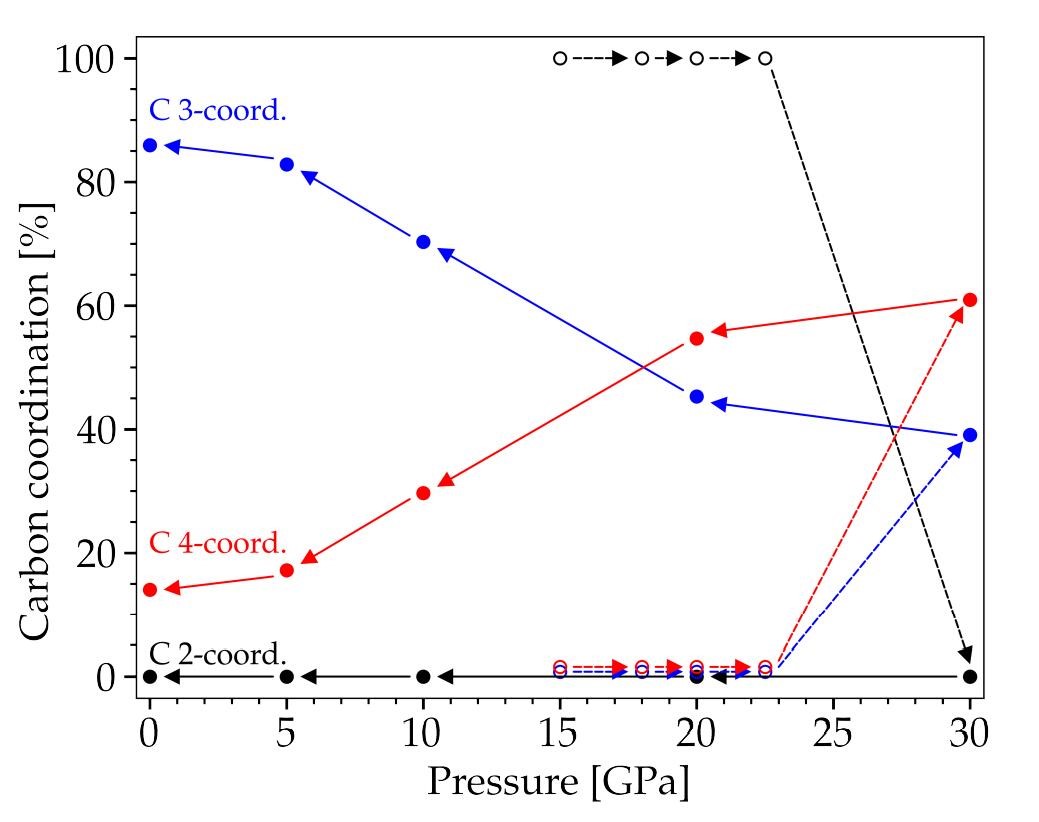Non-molecular carbon disulfide (CS2) is widely viewed as a Bridgman’s polymer, [-(C=S)-S-]n which found by Bridgman in 1941, utilizing high pressure techniques. In Bridgman’s polymer, there are only carbon-sulfur bonds without bonds about carbon atoms, and all carbon atoms are 3 fold coordinated, which is a little different from the carbon in carbon dioxide (CO2).
Recently, a research team from the Hefei Institute of Solid-state Physics (ISSP) of the Hefei Institutes of Physical Science (HFIPS), Chinese Academy of Sciences (CAS) has studied the structural evolution of disordered polymeric carbon disulfide upon compression and decompression, and found non-molecular carbon disulfide was a mixture containing 3 and 4 fold coordinated carbon atoms in different polymers, rather a pure Bridgman’s polymer.
The results were recently published in J. Phys. Chem. Lett.
In this research, the team combined the spectroscopies, ab intio molecular dynamic (MD) simulation to search the structures and bonding behaviors of non-molecular carbon disulfide.
"Now we know more about the bonding behaviors of the class of group IV and VI, AB2 compounds,” said Yan, a member of the team, “Pressure increases the coordination of cation.” For example, the coordination goes from 4 to 6 in SiO2, GeO2, SiS2, but it goes from 2 to a mixture of 3/ 4 and then only have 4 at higher pressures, which is more likely to carbon disulfide.
This research results showed that amorphous CS2 was a mixture compounds having 3 and 4 coordinated carbon atoms. This investigation promoted the understanding of the bonding behaviors of the class of group IV and VI AB2 compounds.
This work was supported by the National Natural Science Foundation of China, Youth Innovation Promotion Association of CAS, Innovation Grant of the Chinese Academy of Sciences, the Science Challenge Project, CAS President’s Internal Fellowship Initiative Found and the CASHIPS Director's Fund et al.
Link to the paper: High-Pressure Structural Evolution of Disordered Polymeric CS2

The fraction of C atoms with different coordination, as function of pressure from ab intio MD. (Image by YAN Jinwei)
Contact:
ZHAO Weiwei
Hefei Institutes of Physical Science (http://english.hf.cas.cn/)
Email: annyzhao@ipp.ac.cn
 Tel: +86-551-65591206
Tel: +86-551-65591206
 Fax: +86-551-65591270
Fax: +86-551-65591270
 Emai: zhous@hfcas.ac.cn
Emai: zhous@hfcas.ac.cn
 350 Shushanhu Road
350 Shushanhu Road